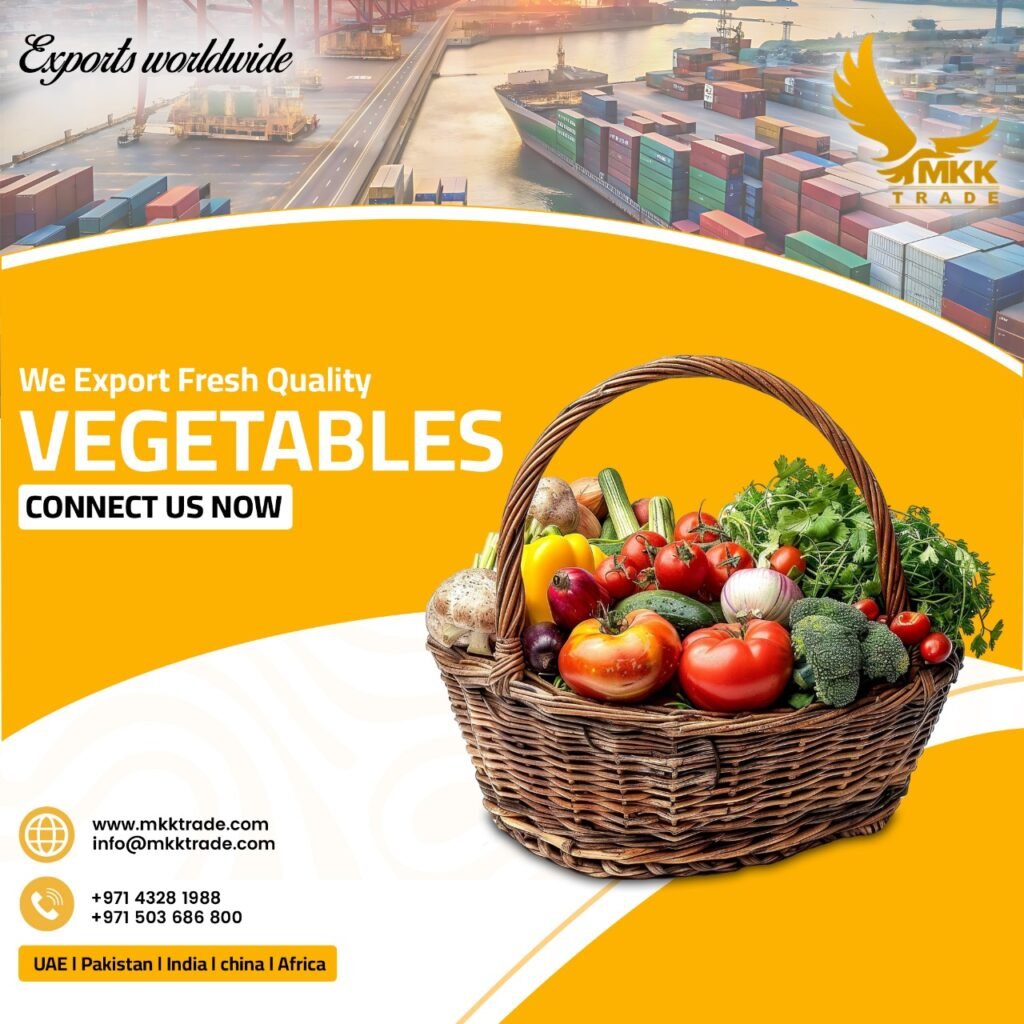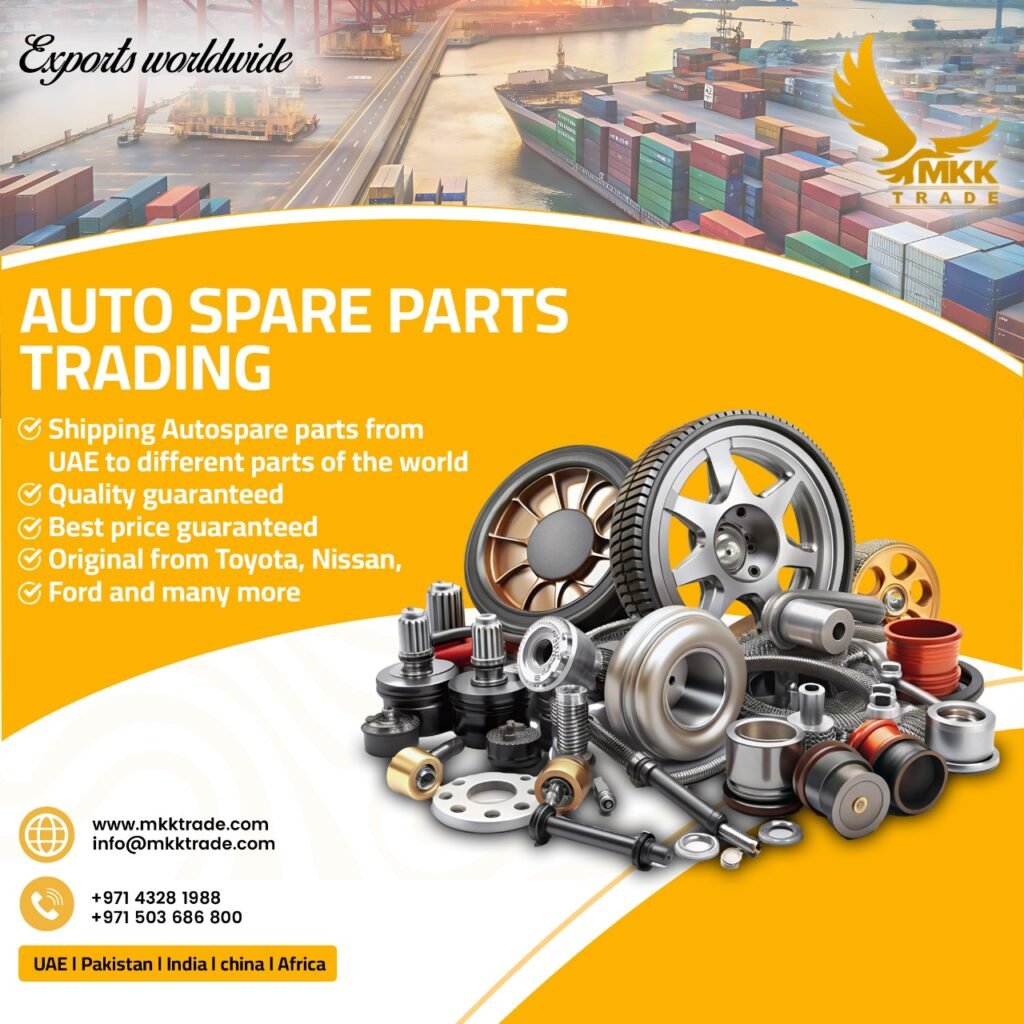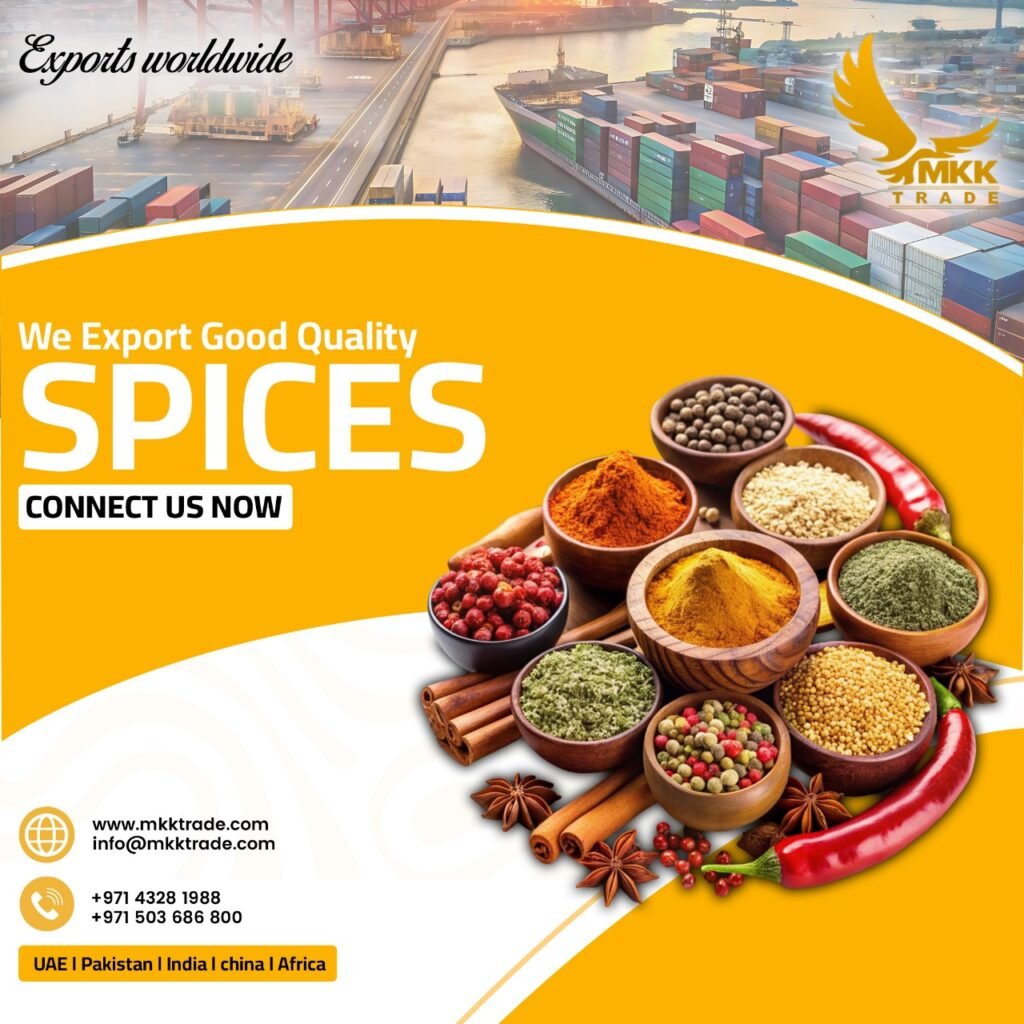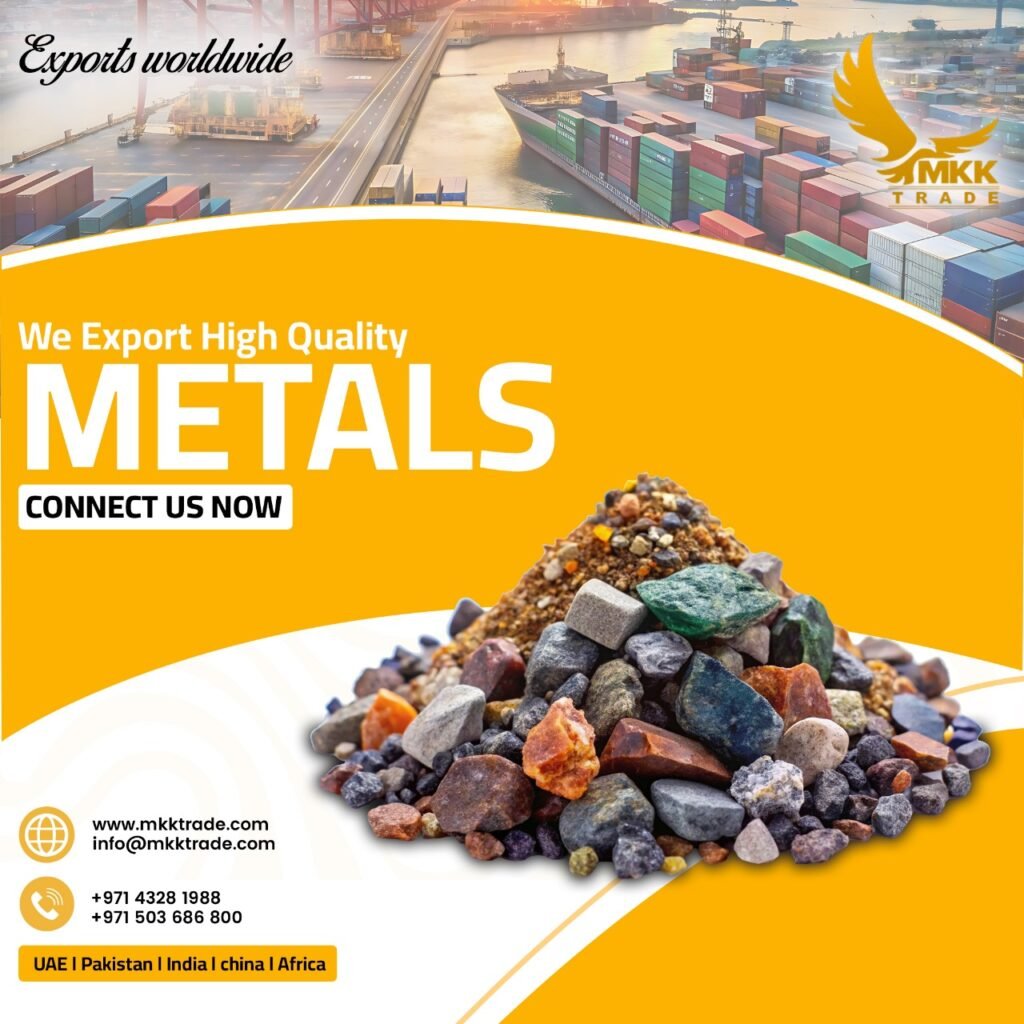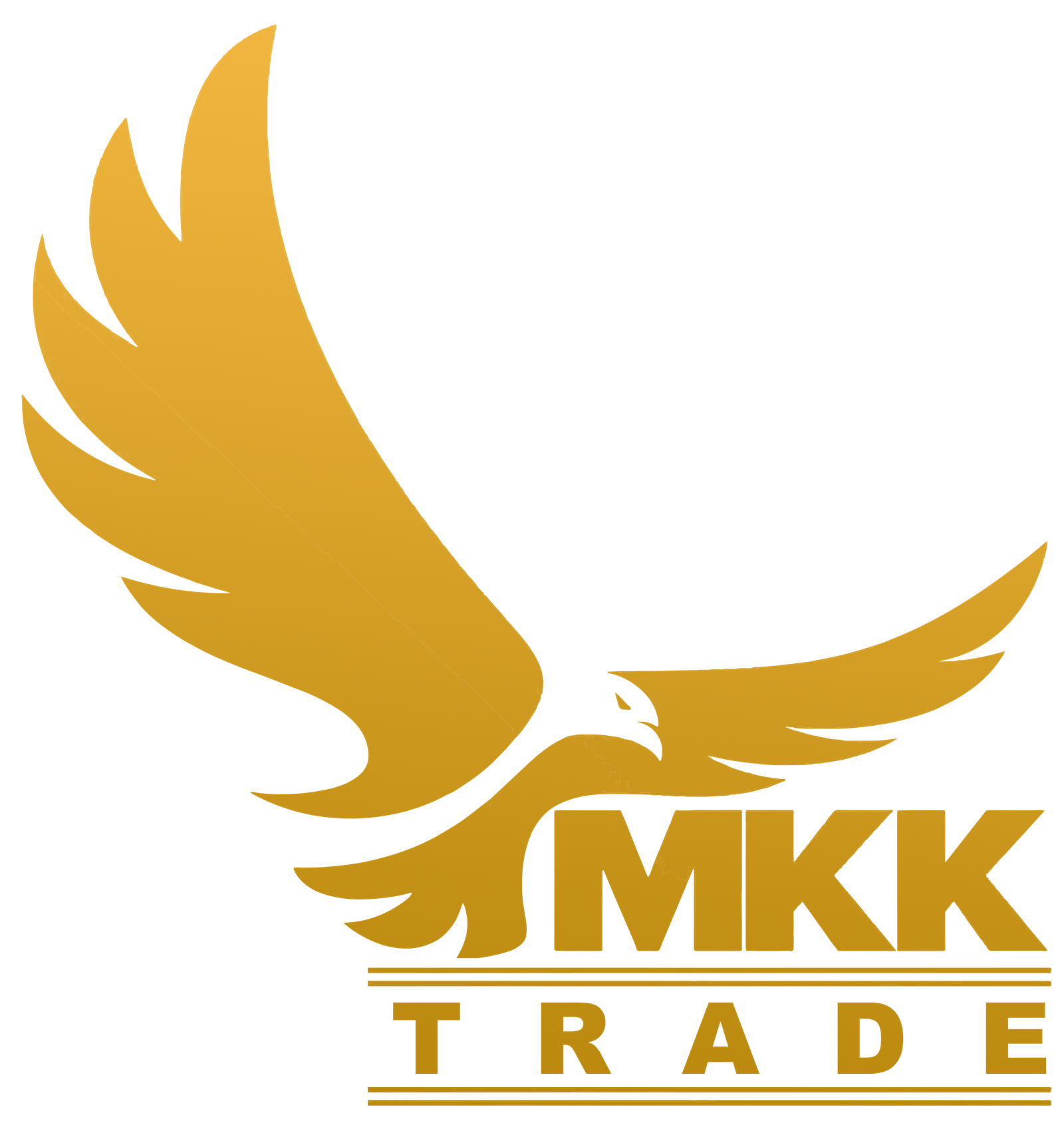Office #207-2nd Floor-ZALFA BUILDING-NEAR Jumeirah Creekside Hotel-Garhoud -Dubai UAE

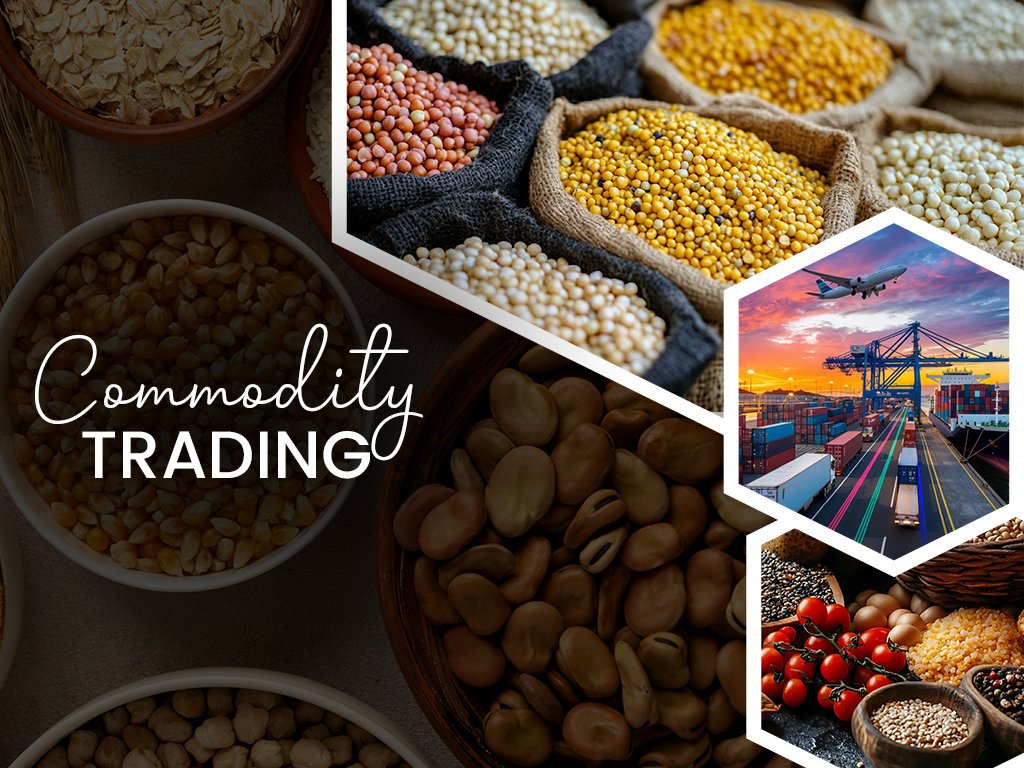









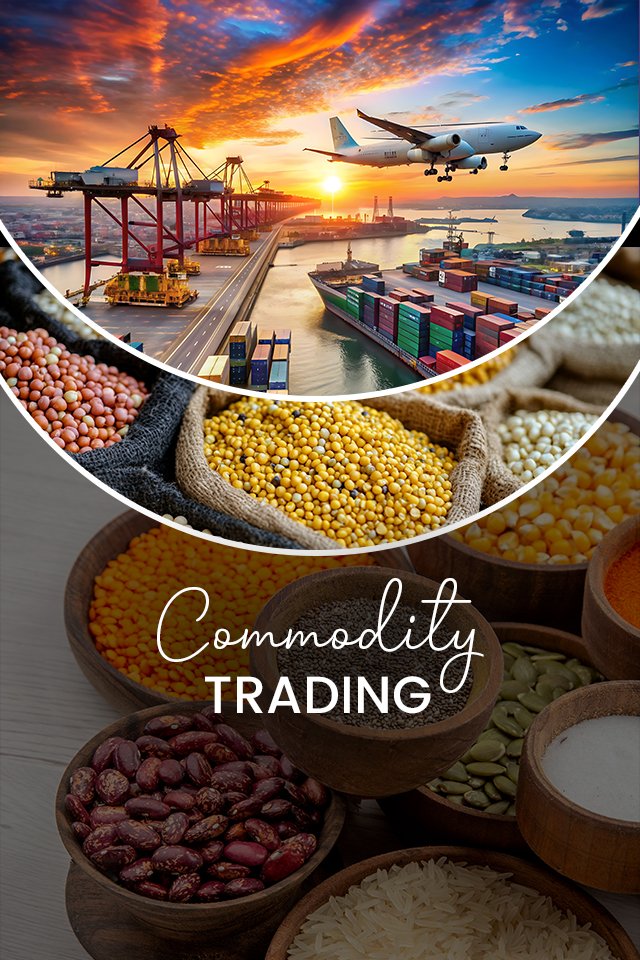




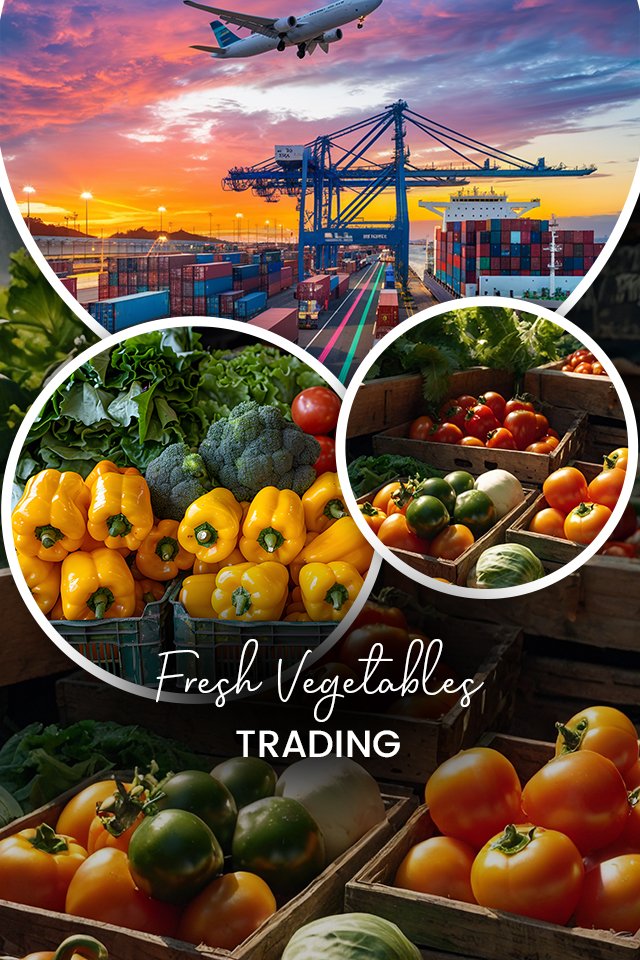
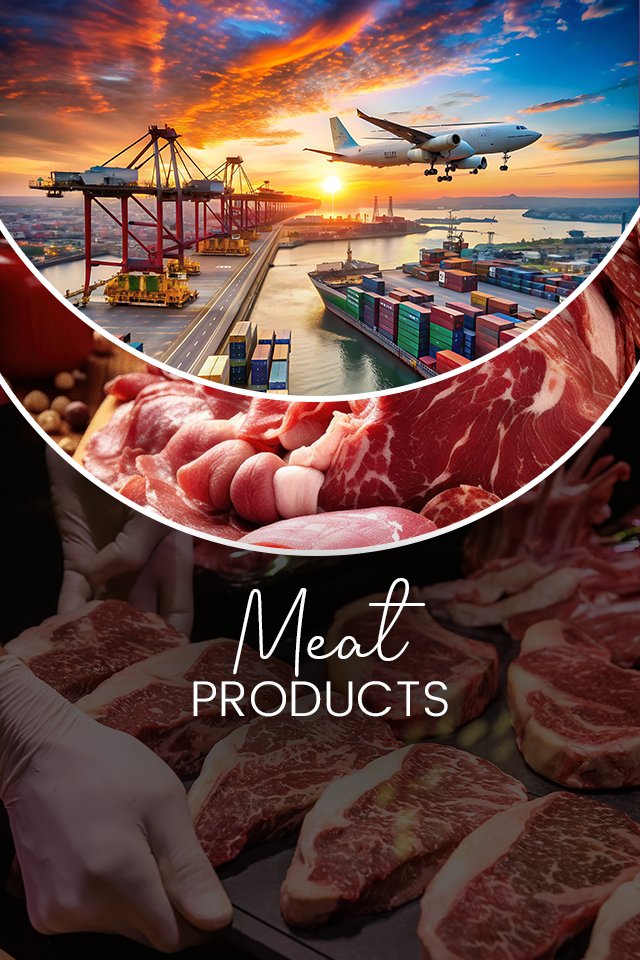
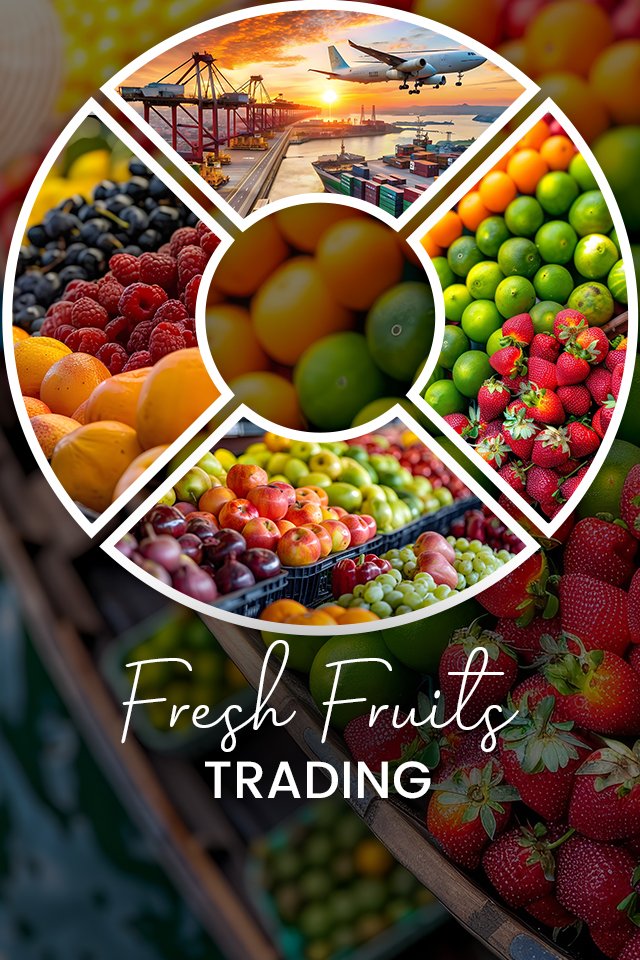







Work Hours
Mon - Sun / 12 am - 12pm
Book a Table
(850) 324-7023
Best Menu
Taste the difference

MKK Trade: Nourishing Lives, Crafting Spaces, Weaving Dreams
Exporter in UAE
MKK Trade is a dynamic and trusted trading company specializing in the supply of high-quality trade in commodities. With a commitment to excellence, MKK Trade connects businesses with top-tier products sourced from reputable suppliers worldwide. Our diverse range of offerings caters to various industries, ensuring that our clients receive the best solutions to meet their specific needs.
- Take away
- Home delivery
Our Categories
Commodity Trading
our Commodity Trading division provides a robust platform for trading essential commodities across multiple sectors. We leverage our global network and industry expertise to offer a diverse range of high-quality commodities.
Metals, Minerals Trading
MKK Trade is a trusted supplier of high-quality metals and minerals, supporting a wide range of industries including construction, manufacturing, automotive, and energy.
Spices And Pulses
Spices and Pulses are essential to kitchens around the world, offering both flavor and nutrition. MKK Trade provides the highest quality products to ensure your business can meet market demand while maintaining the integrity and flavor of your offerings.
Auto Spares, Oils, and Mechanical
We offer a comprehensive range of products to meet the demands of workshops, manufacturing units, vehicle service centers, and distributors. Our commitment to sourcing only the best products.
Fresh Vegetables
MKK Trade offers a diverse selection of fresh, high-quality vegetables sourced from trusted growers around the world. Our range includes leafy greens, root vegetables, tomatoes, peppers, and more, all carefully harvested and delivered to ensure maximum freshness and flavor
Meat Products
Our meat products are sourced from certified suppliers who adhere to the highest standards of hygiene, quality, and ethical farming practices. We ensure that your business receives fresh, safe, and top-quality meat products
Building Materials
We provide a comprehensive range of building materials, including cement, steel, wood, and insulation products. Our materials are sourced from reliable manufacturers.
Fabric Trading
Our fabric division offers a wide variety of textiles, from luxurious fashion fabrics to durable industrial materials. We pride ourselves on offering fabrics that combine quality, aesthetics, and functionality.
Fresh Fruits
MKK Trade supplies a wide variety of fresh, premium-quality fruits sourced from leading growers across the globe. Our selection includes tropical fruits, citrus varieties, berries, and more, all carefully picked to ensure exceptional taste, freshness, and nutritional value.
Global Sourcing: India, China, Pakistan, and Africa
Bringing You the Best from Leading Global Markets
Our strong relationships with trusted suppliers in these regions allow us to offer a diverse range of commodities and materials, ensuring that our clients receive products that meet international quality standards at competitive prices

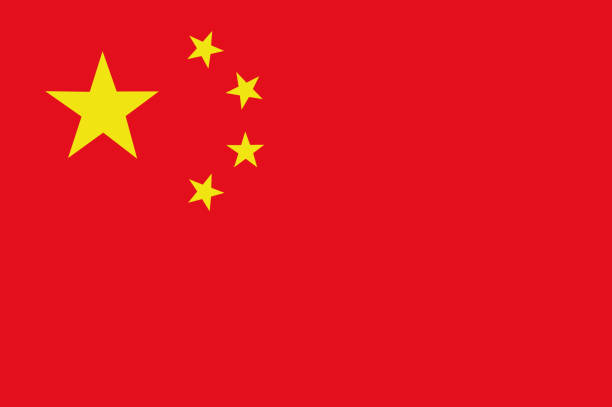



MKK Trade: Your Trusted Source for Food, Fabric, and Foundations
With years of experience and a deep understanding of the industries we serve, MKK Trade is uniquely positioned to provide the products and services that businesses need to thrive. Our team of experts is dedicated to offering personalized support, ensuring that you receive the right solutions for your business.
Why Choose MKK Trade:
Diverse Product Range to Meet All Your Needs
Expertise and Experience
With years of experience in the industry, MKK Trade brings a wealth of knowledge and expertise to every transaction. Our team understands the intricacies of the markets we operate in, from foodstuffs to construction materials and textiles.
Sustainability and Responsibility
In an era where sustainability is more important than ever, MKK Trade is committed to responsible business practices. We partner with eco-conscious suppliers and prioritize products that have a reduced environmental impact
Uncompromising Commitment to Quality
Quality is the cornerstone of MKK Trade’s operations.Whether you’re purchasing foodstuffs, building materials, or fabrics, you can trust that MKK Trade delivers only top-tier products.
Reliable and Timely Deliveries
We know that timely deliveries are crucial to keeping your operations running smoothly. MKK Trade is committed to providing reliable and prompt delivery services, ensuring that your orders arrive when you need them
Choosing MKK Trade means partnering with a company that values quality, reliability, and customer satisfaction. Our diverse product range, commitment to excellence, competitive pricing, and personalized service make us the ideal choice for businesses in need of foodstuffs, building materials, and fabrics. We are more than just a supplier; we are a partner dedicated to your success.

$25
Chicken Wings
Curabitur auctor leo et libero consectetur gravida.
Chicken Breast
Duis vestibulum elit vel neque pharetra vulputate. Quisque scelerisque nisi urna.
$20
$7
Mojito
Etiam facilisis ligula nec velit posuere egestas. Nunc dictum lectus sem, vel dignissim purus.
Greek Salad
Vestibulum commodo sapien non elit porttitor, vitae volutpat nibh mollis.
$10
Fresh Produce
Packaged Goods
Specialty Foods
Salmon fillett$10
Maecenas interdum lorem eleifend orci aliquam mollis.
Creamy fish pie$15
Maecenas interdum lorem eleifend orci aliquam mollis.
Filet of sea bass$25
Maecenas interdum lorem eleifend orci aliquam mollis.
Traditional fish and chips$25
Maecenas interdum lorem eleifend orci aliquam mollis.
Beaf burger$6
Maecenas interdum lorem eleifend orci aliquam mollis.
Rib eye steak$25
Maecenas interdum lorem eleifend orci aliquam mollis.
Fried chicken dumpling $15
Maecenas interdum lorem eleifend orci aliquam mollis.
Roasted chicken breast$25
Maecenas interdum lorem eleifend orci aliquam mollis.
Exporter in UAE MKK Trade is a prominent exporter based in the UAE, engaged in the international trade of various products across multiple sectors. The company has carved a niche for itself by focusing on quality, reliability, and customer satisfaction. Here’s a detailed overview of MKK Trade's operations, significance, and areas of specialization: Exporter in uae Exporter in Abu Dhabi Exporter in Dubai Exporter in Sharjah Exporter in Ajman Exporter in Umm Al Quwain Exporter in Ras Al Khaimah Exporter in Fujairah 1. Diverse Product Range MKK Trade offers a wide array of products, catering to various industries. Some of the primary categories include: Agricultural Products: This includes a range of fresh fruits and vegetables, grains, and other food items that meet international quality standards. Meat Products: MKK Trade exports various types of meat, including beef, mutton, and chicken, adhering to strict health and safety regulations to ensure quality and freshness. Textiles and Fabrics: The company is involved in the export of various types of fabrics, serving both commercial and industrial needs. Construction Materials: MKK Trade also supplies construction materials, contributing to the booming construction sector in the Middle East and beyond. Automotive Parts and Spares: They provide auto spare parts for various vehicle brands, meeting the demands of the automotive industry. 2. Strategic Location Located in the UAE, MKK Trade benefits from the country's strategic geographic position as a global trade hub. The UAE’s well-developed infrastructure, including ports and logistics facilities, facilitates the efficient movement of goods to international markets. This advantageous location allows MKK Trade to reach customers across the Middle East, Asia, Africa, and beyond, enhancing its export capabilities. 3. Quality Assurance MKK Trade places a strong emphasis on quality assurance. The company ensures that all products exported meet international quality and safety standards. This commitment to quality not only helps in building trust with clients but also enhances the company's reputation in the global market. By implementing rigorous quality control processes, MKK Trade aims to provide only the best products to its customers. Exporter in uae Exporter in UAE Exporter in uae Exporter in uae Exporter in uae Exporter in uae Exporter in uae Exporter in uae 4. Customer-Centric Approach MKK Trade adopts a customer-centric approach, focusing on understanding and fulfilling the specific needs of its clients. The company works closely with its customers to provide tailored solutions, whether in terms of product specifications, delivery schedules, or pricing. This personalized service helps build long-lasting relationships and fosters customer loyalty. 5. Sustainability Practices In line with global trends, MKK Trade is increasingly focusing on sustainable practices in its operations. This includes sourcing products responsibly, minimizing waste, and adopting eco-friendly packaging solutions. By prioritizing sustainability, MKK Trade not only meets the growing consumer demand for environmentally friendly practices but also contributes positively to the communities it serves. 6. Compliance with Regulations As an exporter, MKK Trade ensures compliance with all local and international trade regulations. This includes adhering to customs requirements, import/export regulations, and quality certifications. Such compliance is crucial for smooth operations and helps prevent legal issues that could disrupt trade. Exporter in UAE Exporter in UAE Exporter in UAE Exporter in UAE Exporter in UAE Exporter in UAE Exporter in UAE Exporter in UAE Exporter in UAE Exporter in UAE Exporter in UAE Exporter in UAE Exporter in UAE Exporter in UAE Exporter in UAE Exporter in UAE Exporter in UAE Exporter in UAE Exporter in UAE Exporter in UAE Exporter in UAE Exporter in UAE Exporter in UAE Exporter in UAE Exporter in UAE Exporter in UAE Exporter in UAE Exporter in UAE V Exporter in UAE Exporter in UAE Exporter in UAE Exporter in UAE Exporter in UAE Exporter in UAE Exporter in UAE Exporter in UAE Exporter in UAE Exporter in UAE Exporter in UAE Exporter in UAE Exporter in UAE Exporter in UAE Exporter in UAE Exporter in UAE Exporter in UAE Exporter in UAE Exporter in UAE Exporter in UAE 7. Global Partnerships MKK Trade has established partnerships with various suppliers and distributors worldwide. These collaborations enhance the company's ability to source high-quality products and expand its market reach. By fostering strong relationships with international partners, MKK Trade can offer competitive pricing and diverse product options to its customers. Conclusion In summary, MKK Trade stands out as a significant player in the UAE’s export sector, characterized by its diverse product offerings, commitment to quality, customer-centric approach, and focus on sustainability. Its strategic location in the UAE, coupled with effective compliance and global partnerships, positions MKK Trade as a reliable exporter capable of meeting the demands of various international markets. As global trade continues to evolve, MKK Trade is poised to adapt and grow, contributing to the UAE’s reputation as a leading trade hub. Exporting refers to the process of selling goods and services produced in one country to buyers in another country. This vital component of international trade allows businesses to expand their market reach beyond domestic borders, fostering economic growth and generating foreign currency. Here's a detailed look at the exporting process, its significance, and best practices: 1. The Export Process Market Research: Before exporting, businesses must conduct thorough market research to identify potential markets, understand consumer preferences, and analyze competition. This research helps determine the feasibility and demand for the product in target markets. Regulatory Compliance: Exporters must comply with various regulations, both in their home country and the destination country. This includes obtaining necessary licenses, permits, and customs documentation to ensure smooth transit of goods. Product Adaptation: Depending on the target market, products may need adaptation to meet local standards or preferences. This could involve changes in packaging, labeling, or even product specifications to align with consumer expectations. Logistics and Shipping: Efficient logistics is crucial for successful exporting. This includes selecting shipping methods, managing freight forwarding, and arranging warehousing if necessary. Timely and cost-effective transportation impacts customer satisfaction and overall profitability. Payment and Financing: Exporters must establish payment methods, such as letters of credit, bank transfers, or advance payments, to ensure secure transactions. Understanding the financial implications of exporting, including currency fluctuations and international banking, is essential for effective cash flow management. 2. Significance of Exporting Economic Growth: Exporting contributes significantly to a country’s GDP and overall economic growth. It creates jobs, stimulates production, and fosters innovation as companies seek to remain competitive in international markets. Market Diversification: By entering international markets, businesses can reduce their reliance on domestic sales and mitigate risks associated with economic fluctuations. Diversifying markets helps stabilize revenue streams and enhances business resilience. Increased Profitability: Exporting often allows businesses to access larger markets, resulting in higher sales volumes and potential economies of scale. Products may also be sold at higher prices in international markets, boosting profitability. Global Networking: Exporting helps businesses establish international relationships and networks, opening doors to collaboration and partnerships. These connections can lead to new opportunities for innovation and growth. 3. Best Practices for Successful Exporting Understanding Local Markets: It is essential for exporters to understand cultural nuances, consumer behavior, and local regulations in target markets. Engaging local partners or consultants can provide valuable insights and facilitate market entry. Effective Marketing Strategies: Developing tailored marketing strategies for each market is crucial. This includes digital marketing, participation in trade shows, and building a brand presence to increase visibility and attract potential buyers. Quality Control: Ensuring consistent quality across all markets is vital for maintaining a positive reputation. Regular quality checks and adherence to international standards can help mitigate issues that arise during shipping or production. Risk Management: Exporting involves various risks, including political instability, economic fluctuations, and currency risks. Implementing risk management strategies, such as insurance and diversification, can help protect against potential losses. Building Strong Relationships: Establishing trust and strong relationships with international buyers, distributors, and logistics partners is essential. Good communication and reliable service can foster long-term partnerships that benefit both parties. Conclusion In conclusion, exporting is a critical activity for businesses looking to expand their market presence and drive growth. By understanding the exporting process, recognizing its significance, and implementing best practices, companies can successfully navigate the complexities of international trade. As globalization continues to evolve, effective exporting strategies will remain essential for companies seeking to thrive in a competitive global marketplace. Exporting is a critical component of global trade, allowing countries to sell domestically produced goods and services to international markets. Various types of products are commonly exported, each with its own unique characteristics, market demands, and opportunities. Below is an in-depth exploration of the major categories of exported products, highlighting their significance in international trade. 1. Agricultural Products Agricultural exports are among the most vital in global trade, representing a substantial portion of many countries' export revenues. This category includes a wide range of goods: A. Fruits and Vegetables Fresh Produce: Countries with favorable climates, such as those in the Mediterranean or tropical regions, often export fresh fruits and vegetables. Common exports include citrus fruits (oranges, lemons), berries (strawberries, blueberries), and exotic fruits (mangoes, pineapples). Processed Foods: Many countries also export canned, frozen, or dried fruits and vegetables, catering to diverse consumer preferences and extending shelf life. B. Grains and Cereals Staple Crops: Grains like rice, wheat, corn, and barley are fundamental to global food security and are among the most traded commodities. Major exporters, like the United States, Canada, and Australia, play crucial roles in meeting international demand. Specialty Grains: Quinoa and other ancient grains are gaining popularity, especially in health-conscious markets, further diversifying export opportunities. C. Livestock and Animal Products Meat Products: Countries with large agricultural sectors often export beef, pork, chicken, and lamb. The quality and safety of meat exports are critical, with many countries adhering to strict health regulations. Dairy Products: Cheese, milk, and butter are also significant exports, especially for countries with established dairy industries. 2. Textiles and Apparel The textile and apparel industry is a significant player in global trade, driven by fashion trends, consumer demand, and competitive manufacturing costs. A. Clothing and Garments Ready-Made Garments: Many developing countries, like Bangladesh and Vietnam, are major exporters of ready-made clothing due to their low labor costs. These garments are often sold to multinational retailers and fashion brands. Luxury Fashion Items: High-end brands from countries like Italy and France export luxury clothing, accessories, and designer collections to affluent markets worldwide. B. Fabrics and Raw Materials Textile Fabrics: Countries like China and India export a variety of fabrics, including cotton, silk, and synthetic materials, to support global apparel manufacturing. Home Textiles: Bed linens, curtains, and towels are commonly exported, catering to both domestic and international retailers. 3. Machinery and Equipment Exporting machinery and industrial equipment is critical for many countries, particularly those with advanced manufacturing sectors. A. Industrial Machinery Manufacturing Equipment: Countries with strong industrial bases, like Germany and Japan, export machinery used in production processes, including CNC machines, robotics, and assembly line equipment. Agricultural Machinery: Tractors, harvesters, and irrigation systems are essential exports for countries with advanced agricultural technologies. B. Construction Equipment Heavy Machinery: Excavators, bulldozers, and cranes are often exported to support construction projects in developing countries. These exports are vital for infrastructure development and urbanization. 4. Automotive Parts and Vehicles The automotive industry is a major player in international trade, with numerous countries exporting both complete vehicles and parts. A. Complete Vehicles Passenger Cars and Trucks: Major manufacturers in countries like Japan, Germany, and the United States export a significant volume of vehicles worldwide. These exports cater to various markets, including electric and hybrid vehicles as consumer preferences evolve. Luxury Vehicles: High-end brands, particularly from Europe, also play a significant role in the global automotive market, exporting luxury cars and SUVs. B. Auto Parts and Accessories Replacement Parts: Many countries, including China and South Korea, export automotive components such as engines, batteries, and electronic systems to global markets. The aftermarket for auto parts is a substantial segment of international trade. 5. Consumer Electronics The consumer electronics sector has seen rapid growth in international trade, driven by technological advancements and changing consumer behavior. A. Home Appliances Major Appliances: Products like refrigerators, washing machines, and air conditioners are commonly exported, with countries like China dominating the market due to their manufacturing capabilities. Small Electronics: Items such as microwaves, blenders, and coffee machines also represent significant export categories. B. Smart Devices Smartphones and Tablets: Leading technology companies, primarily from the United States and South Korea, export smartphones and tablets, responding to the global demand for connected devices. Wearable Technology: Products like smartwatches and fitness trackers are increasingly popular in international markets, reflecting trends in health and fitness. 6. Chemical Products The chemical industry is crucial for global trade, encompassing a wide range of products used in various sectors. A. Pharmaceuticals Medicines and Vaccines: Countries with advanced pharmaceutical industries, like Switzerland and Germany, export a significant volume of medicines, including vaccines and treatments for various diseases. Biotechnology Products: Innovations in biotechnology have led to the export of specialized products, including biologics and biosimilars. B. Industrial Chemicals Basic Chemicals: Countries export a wide range of industrial chemicals, including fertilizers, petrochemicals, and specialty chemicals, which are vital for agriculture, manufacturing, and other industries. Conclusion The types of products commonly exported reflect the diverse landscape of global trade, driven by consumer demand, technological advancements, and the unique capabilities of producing countries. From agricultural products to machinery, textiles, automotive parts, electronics, and chemicals, each category plays a crucial role in the international economy. By understanding these categories, businesses can better navigate the complexities of exporting, identify opportunities, and contribute to the global marketplace. As international trade continues to evolve, companies that adapt to changing market conditions and consumer preferences will be well-positioned for success.
